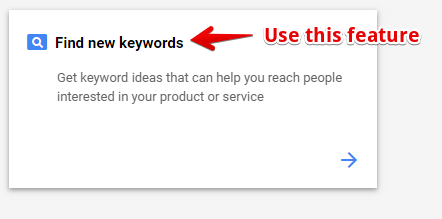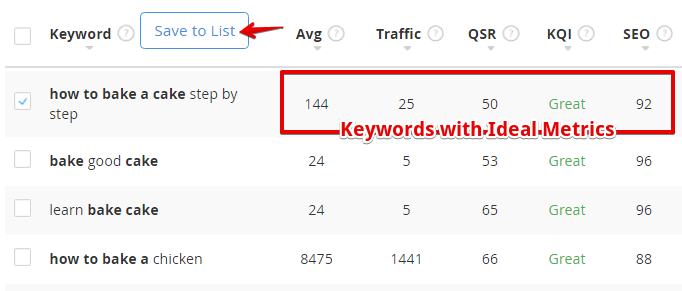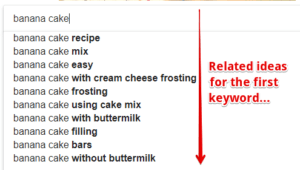 If you have been running a blog for a while, you’ll know the importance of fueling it with content. If you are new to blogging, then it’s wise to learn how to create a keyword list first so that you can be better prepared for writing content later on. But before we get into organizing things, there’s a need to understand why keywords are so darn important in the first place.
If you have been running a blog for a while, you’ll know the importance of fueling it with content. If you are new to blogging, then it’s wise to learn how to create a keyword list first so that you can be better prepared for writing content later on. But before we get into organizing things, there’s a need to understand why keywords are so darn important in the first place.
Every Keyword Is a Persona
By that, I mean that every search terms you could think of, derive from someone’s intention. These keywords hold information about who they are AND what they are looking for in the online space. From the perspective of a consumer who wants to buy a product or hire a service, they are most likely interested in information pertaining to the benefits, costs, features, the pros, and cons of a particular product.
So while keywords are strategically used for indexing and ranking on the search engines, they should be regarded first and foremost, as ‘thoughts’ by your potential audience. If you constantly keep this in mind, then creating content will feel more like having a conversation with someone versus writing on a blank white space.
At any given time, there are countless ‘thoughts’ running through different niche spaces every single day and because you are only human, it is impossible to figure out every single persona by yourself. There are limitations to how many search terms you could come up with and that’s why brainstorming for keywords is crucial BEFORE building a list.
Where to Acquire Keywords
There are many places one could go to search for keywords, but from a marketer’s point of view, your content should address the ‘pain points’ within the niche or at least, as close as you can get to those topics. Urgent situations lead to actions and that’s what we want.
Fortunately, they aren’t difficult to find. New sites, forum questions, online searches, and even eCommerce products are all reflective of topics that are happening within a niche. When you browse through these places, look out for phrases that aren’t only interesting, but also worth writing from a marketing perspective.
To ease the process, open a word document page or if you want to be more organized, use an Excel spreadsheet to compile the keywords that you find along the way.
#1 Google Alert
Long before I started blogging, I was reading a lot of news online. Little did I know, this would be an indispensable tool for discovering keywords because news content itself is home to current topics relevant to many niches. Now, instead of going to the sites, you can get Google to send them to you by creating an alert.
If you haven’t used this feature before, simply follow this link and you’d find an interface that looks something like the one below.

In the first bar, just enter a general topic about the niche like “weight loss”, “drone” or “online business” and set to the frequency as to when you want to have it delivered to your email. There’s no need to be too specific here because we are merely gathering ideas for now.
#2 Google Keyword Planner
Another free tool by Google is called the Keyword Planner and it’s important to know that it is predominantly used for creating ad campaigns. If you are optimizing for SEO, the metrics within this tool will not be relevant, but one can still generate keywords and draw ideas from there.

Over here, you can opt for more specific phrases – within 2 to 3 words – about general topics, product or even local searches. When you are on the page, select the ‘Find New Keywords’ feature (and NOT Search Volume and Forecasts), enter a topic and a list will be generated based on that key phrase. The result will produce relevant phrases pertaining to your initial topic.
#3 Google Search
Most of the time, this is the place where I would go to discover keywords because it’s a dynamic approach and more straightforward. Also known as the Alphabet Soup Technique, one just needs to enter words – from the front or the back – into the search bar and find other related keywords suggested by Google.
These are, in fact, keywords that other users are typing into the search engines so we know there’s a strong user intention there. I have personally discovered a lot of helpful keyphrases through this technique and would recommend that you do the same too.
#4 Quora
I was never a fan of forum sites – probably because most of them look so outdated – until I discovered Quora and I really have a lot of fun finding keywords from this platform. Why? Because it’s utilized by so many people and experts to answer a variety of niche questions and you can leverage that like your content.

Start by selecting topics that interest you, go into the forums and screen for questions/topics that are relevant to your niche. If you have the time, read the discussion thread to learn more about the subject matter. Often times, you’ll come across a handful of topics that you may not even be aware of.
Recently, the platform has also started allowing ads, so you’ll surely see a lot of companies promoting their products and services in the discussion space. Depending on how you see it, they could either be your competitor or a potential advertiser to partner with. That will definitely create more ideas AND opportunities to grow your blog.
#5 E-commerce Site
Most people would think about shopping when they visit an online store, but for bloggers, it’s more than just that. If you are doing affiliate marketing, you can get a lot of insights from product pages as well as customer feedback, to write better product reviews. The only setback is that you need to read thoroughly and dig out the information manually. That’s why it’s not always the best place to look for keywords, especially when time is lacking.
If you don’t know which eCommerce site to start with, here are some well-established online stores that you can follow.
Processing The Keywords
By now, your spreadsheet should have a handful of interesting keywords that we can filter grossly. Here are the criteria to look out for;
- Keywords must make human sense and come with intent.
- It must be grammatically correct.
- It should contain at least 3 words or more.
- It must be relevant to your niche.
Once you have those narrowed down, it’s time to put some values and see if those topics are worth writing or not. For this purpose, I like to use the Jaaxy Keyword Tool because it’s very simple and it keeps things organized.
On the interface, there are three metrics that matter for your SEO.
- AVG – Average number of searches per month (ideally within the range of 100 to 300)
- QSR – Number of competing websites for the exact keyword (the lower the better)
- SEO – Ranking score (the higher, the better)
At any given time, the tool can produce between 20 to 30 variations (sometimes less) based on the initial keyword and they will be listed on the left side of the column. On the right side, you’ll see a bunch of numbers and that correlates with the metrics that I’ve just mentioned.
In order to appreciate the values better, I would refresh the QSR column by clicking on it once so that the numbers are aligned from the lowest to the biggest. That way, I can easily filter out anything that is less than 10 and only looks at the ones that have less than 100.

Now that I know the metrics are within the ideal range, I would screen for the best keyword variation to use, click on it and save it to a list. I can create any type of list, such as monthly, categories or product reviews – any labels that are easy to understand would be good.
This process will then be repeated for every keyword that is on the spreadsheet.
I know it looks like a lot of work, but in reality, our fingers can actually move at the speed of our thoughts. Once you are accustomed to the step-by-step, you can easily create a keyword list for a month in less than an hour. Sometimes, I could even come up with 30 topic ideas!
Trust me – this technique is worth trying because it will save you a lot of time from having to do research for every single content. It’s better to have a bucket, ready to go so that you can focus on writing good and engaging articles than fretting over keyword choices.
If you want to see Jaaxy in action, just enter an interesting topic below and start building your first list.
Massive Keywords Equals to Massive Traffic
Targeted keywords can lead you to the right audience, but if you have the upper hand of creating a massive keyword list in the shortest amount of time, you are bound to get massive traffic over your competitors. For me, that’s a smarter way to be successful with your blog.
I hope you’ve been enlightened with the tips that I’ve shared here and before you click away, why don’t you check out this free webinar on keyword list building from my recommended online business platform? I am sure you’ll find it beneficial. See you there!



Wow Cathy, this is so educative and revealing.
It’s always a delight reading your blog. You are a rare gem. You have clearly showed how to create a unique niche using keyword listing technique for those who doesn’t know their way around content blogging. It’s a pretty smart approach. I have a question though – do you think the blog market will soon be saturated?
I am glad you benefited from this article, Kabirat.
In my opinion, blogging will always be a constant evolution. Old content will be replaced with new ones, webmasters who are no longer interested in a niche will be dominated by enthusiastic new comers. Since there’s constant product innovation around us, the emergence of new information is inevitable so I believe, there will always be room for more bloggers to come into action. And more opportunity to monetize online as a result.
Hi Cathy – thanks for sharing this helpful post. I don’t think it can be emphasized enough just how important keywords are to the success of an online business. I love the alphabet soup technique. I always get plenty of ideas for content and titles that way. As for Quora, I am not personally a fan, but can see why some people might want to use it for finding keywords.
Well written information on the techniques of using a keyword tool.
I have used quite a few of them. Some are easier to understand than others, but you have laid things out pretty good on what to expect and how to use.
I have used the Jaaxy Keyword tool for all of my blogs and it has been the reason my blog has had some success. After three years of working on my site, I still use it for every blog I write.
How has this tool work out in terms of your blogging experience? Have you gotten good traffic with it? And what kind of density do you shoot for in your blog? Just curious to know. Thanks.
Hi Dave, Jaaxy makes finding long tail keywords easy and yes, my traffic has been steadily growing, but it’s not without the work of other on-page and off-page SEO. Sometimes, you need to actually refresh the page just to get the data for the first result (the first line of keywords) so that’s a bit of a technical hiccup there. Otherwise, the tool works lightning fast and it keeps showing me new keywords all the time.
As for density, I used to write within 1000+ words or so, but for the past year, I am averaging about !500+. It’s not intentional, but because of the amount of research I put into a topic, the result ended up being so.
This was a really informative post and I think anyone can learn from it. Ever since I started blogging seriously, I got huge into keyword research. If you picked the wrong keywords, you won’t rank high which means little to no traffic. So finding low competition keywords is crucial if you are trying to monetize your blog. I like the fact that there are free places you can go to search for them.
I have heard about people actually using Quora to get traffic to their sites by answering questions and linking to their blog posts. It seems like a decent traffic source if you use it correctly.
Hi Matt, linking your posts on Quora’s discussion is a good idea, but it has to be done naturally. I find that some people overdo it and it’s almost like their promoting their sites instead of providing a constructive answer. Just be discreet about it and you should be okay.
This is a great article Cathy! I personally think that making a keyword list is very important for our online business if we want to be successful. Most of the time I only use Jaaxy keyword tool and it’s really great. My question is – do you think that “how to” keywords rank well in Google, or should we seek only “product review” keywords?
Hi Daniel, I have a few ‘How to’ posts that are currently ranking well so it’s not impossible. I think it depends on the competitiveness of one’s niche and how much engagement you can bring to that article. I wouldn’t recommend just going for “product review” keywords – it makes a blog very monotonous and less diverse from the reader’s point of view.